If you’re not tuned into social media, you’re missing out on a goldmine of data that can supercharge your business. Social media listening tools act like magic ears, helping you understand how your customers – and potential ones – view your brand.
They also reveal what people are saying about your competitors. It’s like having instant, real-time market research at your fingertips, as long as you know how to tap into it. Tabs on what people say about your brand, competitors, and specific keywords that matter to you.
When you practice social listening, you’re tuning in to hear whenever someone mentions your brand or discusses your influencer marketing services in India on social media. It’s like eavesdropping on conversations in real time. This eavesdropping can be incredibly valuable because it tells how your customers feel about your products or services, what bugs them, and what they wish you would do differently.
But it’s not just about your brand – you can also use social listening to follow your competitors, see what’s trending, and even gauge the overall mood surrounding topics related to your business.
What Advantages Can a Social Listening Strategy Offer Your Business?

A well-executed social listening strategy can offer numerous benefits to your business. Here are some key ways it can help:
- Customer Insight and Feedback: Social listening lets you tap into your customers’ thoughts and opinions. You can learn what they like and dislike about your products or services, what issues they face, and what improvements they desire. This direct feedback is invaluable for making customer-centric decisions.
- Competitive Analysis: By monitoring your competitors, you can gain a deeper understanding of their strategies, strengths, and weaknesses. This information helps you identify opportunities for differentiation and areas where you can outperform them in the market.
- Crisis Management: Social listening is an early warning system for potential PR crises. You can detect negative sentiment, address issues promptly, and stop minor incidents from escalating into major reputation-damaging events. Swift and effective crisis management can save your brand’s credibility.
- Content Strategy: Understanding the type of content that resonates with your audience allows you to create more engaging and shareable material. This increases online visibility, brand awareness, and more leads and conversions.
- Data-Driven Decision Making: Social listening provides data-backed insights that drive decision-making across various aspects of your business, from marketing to product development. This data-driven approach minimizes guesswork and ensures that your strategies and initiatives are aligned with your audience’s preferences and needs.
Difference Between Social Listening and Social Monitoring
Social listening and monitoring are two related but distinct practices in social media management and analytics. They both involve tracking and analyzing online conversations and activities related to a brand or topic, but they serve different purposes and present unique insights.
Here’s a detailed comparison of the two in a tabular form:
| Aspects | Social Listening | Social Monitoring |
| Purpose | Gain insights and understand long-term trends and sentiment analysis. | Focus on real-time engagement, customer support, and immediate response |
| Data Analysis | Focus on real-time engagement, customer support, and immediate response | Primarily focuses on real-time tracking and management without in-depth analysis. |
| Tools and Software | Tools include features for sentiment analysis, trend tracking, and historical data analysis. | Tools are designed for real-time alerting, notifications, and message management. |
| Strategy | A strategic approach for long-term brand development and campaign planning. | A tactical approach for immediate brand presence, customer satisfaction, and crisis management. |
| User Cases | Market research, competitive analysis, brand reputation management, and trend identification. | Customer support, crisis management, real-time social media interaction, and engagement. |
| Time Horizon | Focuses on long-term trends, historical data, and ongoing conversations. | Emphasizes real-time responses with less focus on historical data analysis. |
If you’re not practicing social media listening, it’s like navigating your business strategy with blindfolds on. Real people are out there talking about your brand and your industry online. It’s essential to tap into what they’re saying.
In What Ways Can a Social Listening Strategy Benefit Your Business?
Know your audience
Social listening tools offer a unique lens through which you can gain profound insights into your audience. It’s not just about knowing who your audience is but also understanding their behaviors, preferences, pain points, and sentiments. Let’s explore how this can be achieved through a case study.
Case Study: Starbucks and Their Coffee Lovers
Imagine you’re the social media manager for Starbucks, one of the world’s most renowned coffee chains. You want to engage with your customers and gain a deep understanding of what makes them tick. This is where social listening tools come into play.
- Identifying Key Conversations: Social listening tools pick up on conversations across various platforms. You notice a trend of discussions surrounding the topic of “iced coffee variations.”
- Sentiment Analysis: Your tools conduct sentiment analysis and reveal that while many customers love the idea of unique iced coffee flavors, some express dissatisfaction about the lack of options in certain locations.
- Demographics Insights: By analyzing user profiles, you discover that a significant portion of these conversations is driven by young adults aged 18 to 30.
Customer relationships and acquisition

In the age of social media, building strong customer relationships and effectively acquiring new customers has become an art form. Social listening tools have emerged as a game-changer for businesses looking to connect with their audience and grow their customer base.
- Customer Relationships: This pertains to nurturing and maintaining strong connections with existing customers. It involves understanding their needs, addressing their concerns, and engaging with them in a way that builds loyalty and trust.
- Customer Acquisition: This involves the strategies and actions to attract new customers. It encompasses understanding what potential customers are looking for and how to engage with them to convert them into loyal patrons effectively.
Case Study: Airbnb’s Journey in Customer Relationships and Acquisition
Let’s examine Airbnb, the global vacation rental platform, and how they’ve harnessed the power of social listening tools to enhance customer relationships and drive customer acquisition.
- Identifying Key Customer Concerns: Using social listening tools, Airbnb noticed increased customer feedback about cleanliness concerns in some listings.
- Real-time Response: Airbnb’s customer support team quickly addressed these concerns, reassuring customers and sharing the steps to improve cleanliness standards.
- Monitoring Competitors: Airbnb monitored discussions about competitors and identified an emerging trend: customers sought more personalized travel experiences.
Business and product intelligence
Social listening tools have revolutionized companies’ gathering business and product intelligence, offering insights beyond traditional market research.
- Business Intelligence: This involves gathering and analyzing data related to market trends, competitor activities, and industry developments. It empowers companies to make informed strategic decisions.
- Product Intelligence: Understanding customer sentiments, needs, and preferences for a particular product or service. It assists in refining product offerings and marketing strategies.
Case Study: Apple’s iPhone Evolution and Market Intelligence
Let’s take a closer look at Apple, a tech giant renowned for its iPhone series, and how social listening tools have played a pivotal role in its journey of business and product intelligence.
- Monitoring Industry Trends: Apple’s social listening team continuously tracks discussions, news articles, and industry reports on mobile technology and consumer electronics.
- Competitor Analysis: Social listening tools allow Apple to closely monitor the activities and customer sentiments surrounding competitors like Samsung and Google.
- Consumer Feedback: Apple actively listens to customer feedback regarding their iPhone models on social media and other online platforms. They take note of both positive feedback and criticism.
Top 7 Social Listening Tools of All Time
1. Digimind – An Onclusive Company
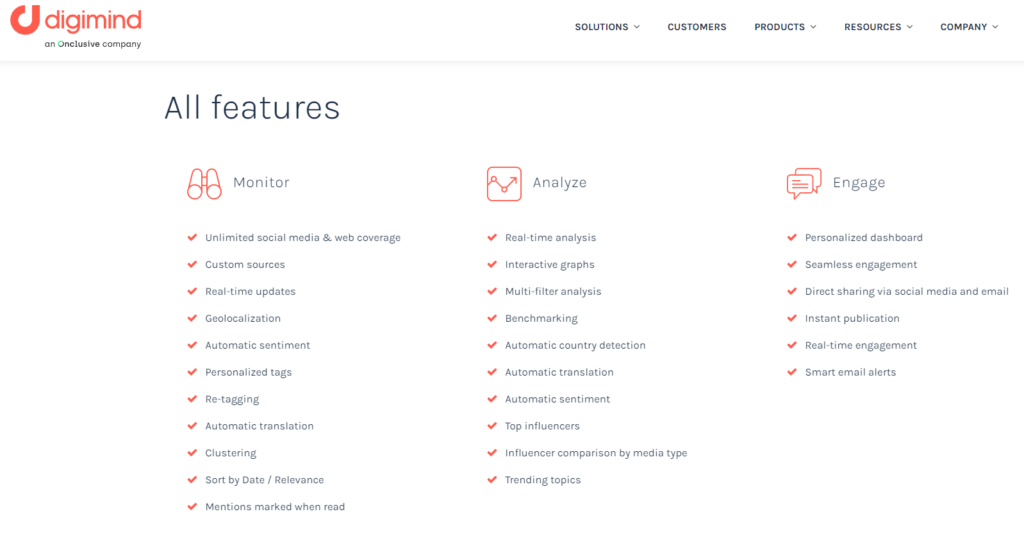
Digimind offers a comprehensive solution for making sense of the vast world of social and online data and turning it into actionable business insights. They present two powerful products: Social Listening and Market Intelligence, each with impressive features.
With Digimind’s Social Listening tools, you can:
- Keep a close eye on specific terms and topics.
- Analyze mentions and discussions about your brand.
- Share content and engage with your audience.
- Generate insightful reports.
- Measure the return on investment (ROI) for paid and organic media.
- Utilize search data for effective reputation management.
Digimind’s tools allow you to instantly access the most relevant conversations concerning your brand across millions of online sources. This real-time insight is valuable for shaping and enhancing your marketing strategy.
2. Agorapulse
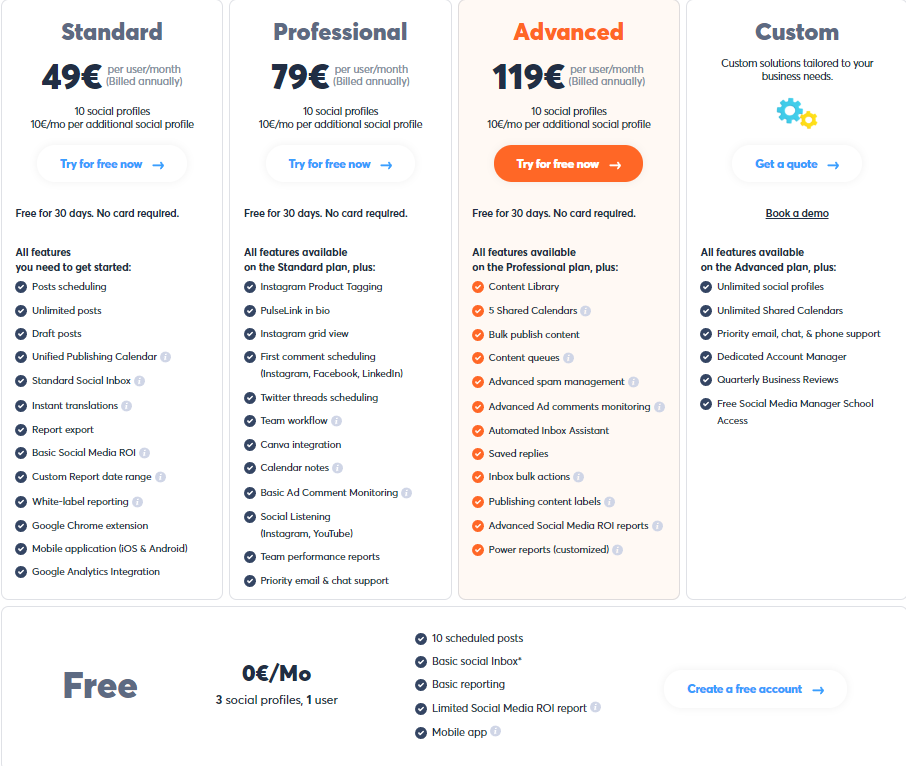
Agora Pulse is another highly professional social media management tool for agencies with social listening features.
It features an extremely clean and straightforward interface.
You can easily set up relevant brand-listening parameters to listen to relevant conversations about your brand. You can refine your YouTube and Twitter searches by providing words NOT to include in your saved searches. Boolean operators allow you to hone in on only what you want to listen to. Add location and language parameters to your Twitter searches to be even more specific.
3. Iconosquare
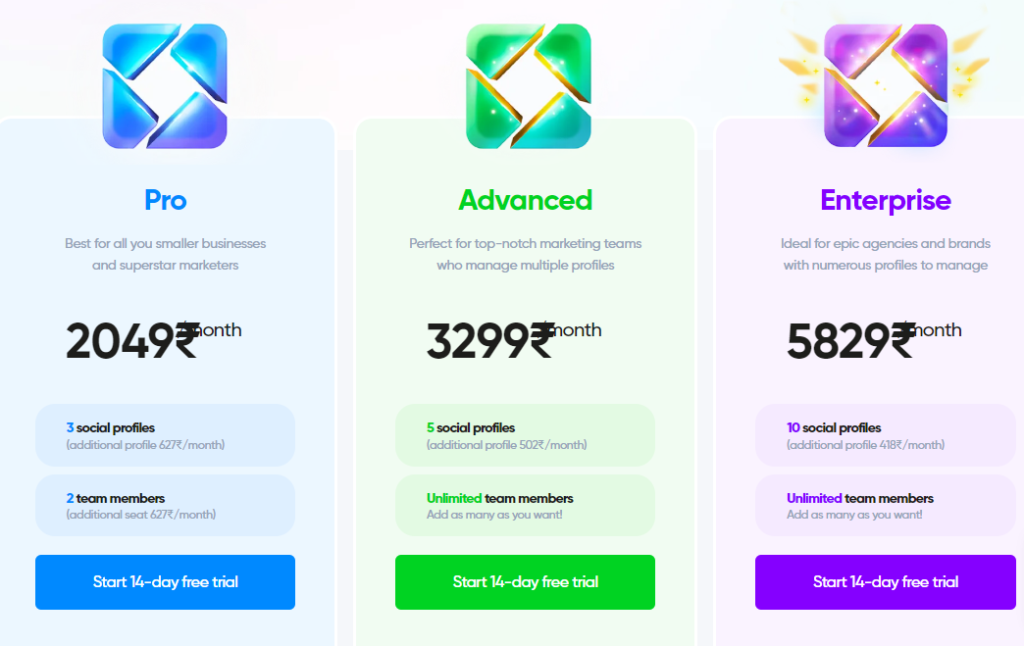
Iconosquare is a remarkable social media listening platform, providing essential tools to master market trends and maintain a competitive edge in your industry. What sets Iconosquare apart from other tools is its unique features designed to cut through the noise and deliver actionable insights.
One standout feature is “Bubble Listening,” a distinctive tool that delves into what customers say about your brand. With Bubble Listening, you can effortlessly track your designated hashtags and instantly access a wealth of analytics. Each piece of data is presented on separate pages for clear visibility.
But that’s just the tip of the iceberg. Iconosquare takes benchmarking to a new level by tapping into data collected from users across your industry. This empowers you to make precise comparisons between your performance and that of your competitors, gaining a comprehensive understanding of your position in the market.
User-friendly comparison tables simplify identifying your strengths and areas that may need improvement. What’s even more advantageous is the ability to export this data for thorough analysis and reporting, making it an invaluable resource for future strategic planning.
4. Brand24
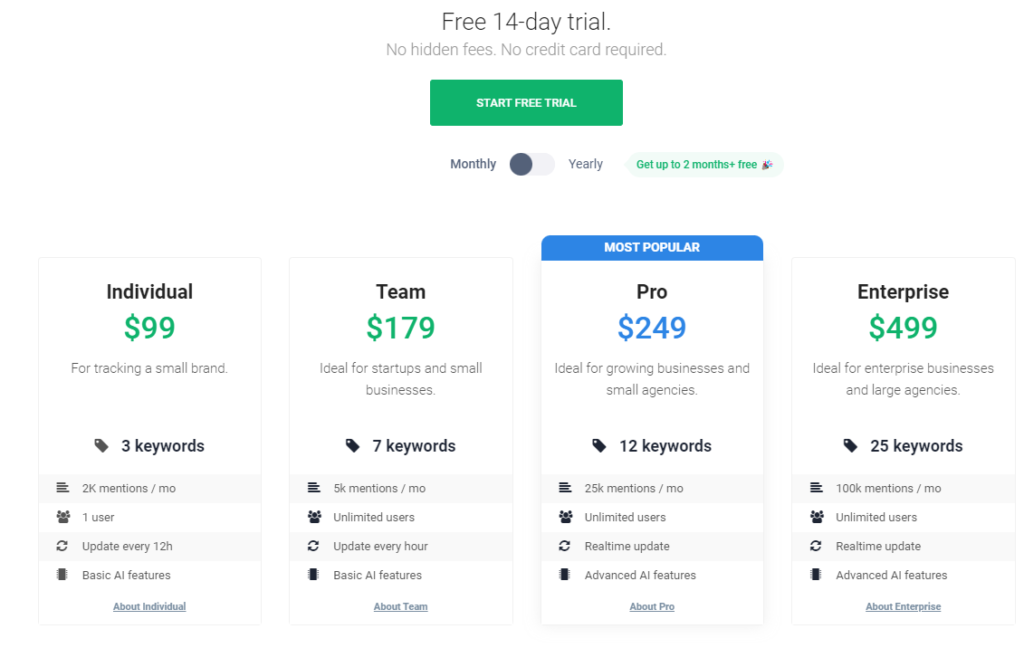
Brand24 offers a valuable window into the online chatter surrounding your brand. What sets it apart from some competitors is its inclusive approach, catering to businesses of all sizes, including small and budding enterprises, with its accessible $99/month package.
The platform presents a mentions feed where you can promptly uncover what’s being said about your brand, allowing you to take immediate action. You’re not just a spectator; you can actively join conversations and engage directly through Brand24.
With the Discussion Volume Chart, Brand24 visually portrays your brand’s mentions, making it a breeze to spot discussion spikes. This tool helps you identify potential issues and areas of interest. Additionally, Brand24 provides comprehensive mention analytics, giving you a deeper understanding of the individuals talking about your brand online.
One of the noteworthy features is Brand24’s Influencer Score, a custom metric designed to help you identify the key players in your industry. It’s a useful tool for connecting with influential figures in your niche.
5. Brandwatch Consumer Intelligence
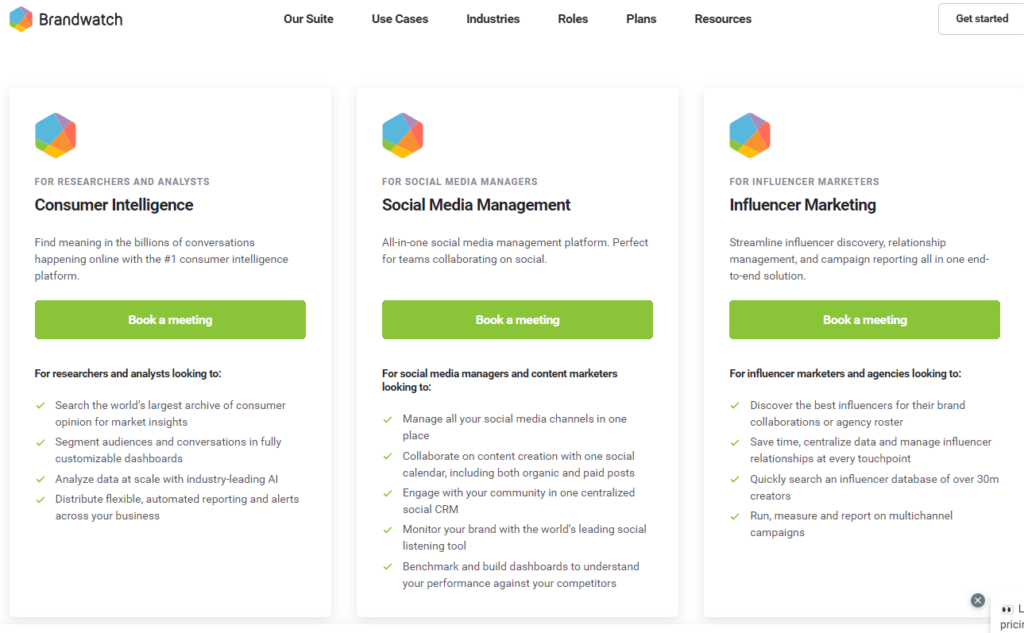
Brandwatch is an all-in-one platform that covers social media listening, publishing, advertising, measurement, and customer data management. Its standout features are its social listening tools, which provide clear insights into ongoing conversations and the key players involved.
These tools are your ticket to discovering popular topics and trending hashtags, invaluable for effectively shaping your campaigns and content.
What sets Brandwatch apart is its remarkable flexibility. You’re not limited to tracking just brand names; you can monitor topics, keywords, and even specific phrases, all while refining your search with advanced parameters. This level of customization is particularly useful if you have a global audience.
6. BuzzSumo
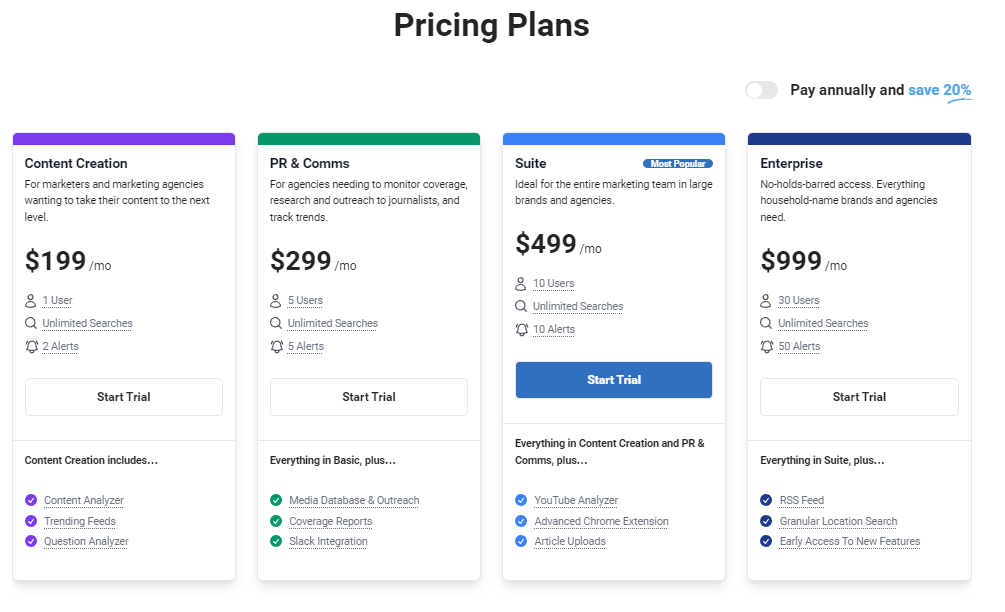
Buzzsumo wears the hat of a content analysis tool while doubling as a social media listening wizard.
Here’s how it works: you input your search term, and Buzzsumo scours the vast expanse of the internet for anything related. But it doesn’t stop at just presenting you with search results. No, it goes the extra mile by providing a crucial piece of information – the level of engagement associated with each result. For instance, if you’re tracking your organization, Buzzsumo doesn’t merely inform you about a blog post critiquing your company’s service; it also tells you that this post was shared 26 times on Facebook and tweeted about a whopping 478 times. This kind of insight is invaluable when you need to do some damage control.
BuzzSumo doesn’t stop at social media platforms; it also provides engagement figures for Facebook, Twitter, Pinterest, and Reddit. Moreover, it tallies the total number of links each search result has garnered.
Buzzsumo’s arsenal also includes a nifty alert feature. You can create tailored alerts to monitor brand mentions, competitor mentions, content from a particular website, keyword mentions, backlinks, or a particular author. The best part? You can set these alerts with parameters that suit your unique needs, ensuring you know what matters most
7. YouScan
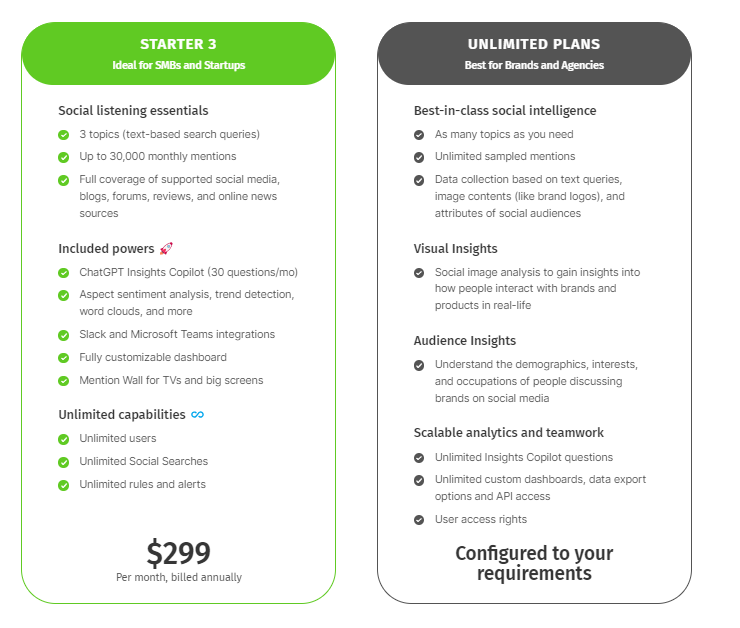
Unlike most social listening tools, where searches increase with higher plans, YouScan offers five consistent searches across all its plans. The magic here lies in the depth of these searches, known as “Topics,” which can be highly detailed. You can include or exclude factors like keywords and hashtags while applying specific rules.
To harness the power of YouScan, you’ll need to input your search queries using Boolean operators. While this may seem a bit technical, fear not – there are only a few operators to get the hang of, and they all make logical sense. However, some marketers may need to improve their Boolean logic skills before diving in.
Once you’ve set the parameters for your search, YouScan does the heavy lifting, presenting a page filled with mentions collected by the platform, all aligned with your search criteria. From there, you can filter the results to zero in on what’s most relevant to your specific search.
One of YouScan’s standout features is its Visual Insights tool, like a magnifying glass for images. You can set detailed parameters to unearth images that match your specific requirements. The image recognition technology behind it is remarkably accurate and can help you uncover in-depth demographic and psychographic information about your brand’s audience.
With YouScan, you can pinpoint brand mentions by influential individuals and identify those with the most engaged audiences. The platform offers Smart Alerts that you can customize to notify you whenever it detects negative sentiment surrounding your brand.
Conclusion
In today’s cutthroat market, grasping what’s said about your brand is vital. Social listening tools let you monitor multiple online channels, seize opportunities, and adapt your marketing strategy in real time. They also help you discover influential partners for your influencer marketing. Start now to gain these competitive advantages and enhance your customer experience.
FAQs
What are social listening tools?
Social listening tools are software platforms that monitor and analyze online conversations and discussions across various social media platforms, blogs, forums, and websites. They provide valuable insights into what people say about a brand, product, or topic.
Why is social listening important for businesses?
Social listening is essential for businesses because it helps them understand customer sentiments, track brand mentions, monitor competitors, identify trends, and make data-driven decisions. It’s a powerful tool for improving customer satisfaction and staying competitive.
What can I monitor with social listening tools?
Using social listening tools, you can monitor brand mentions, keywords, hashtags, competitor activities, industry trends, customer feedback, and more.
How do social listening tools work?
Social listening tools use web crawlers and data analytics to scan online conversations and collect relevant data. They then apply natural language processing and sentiment analysis to understand the context and sentiments expressed in the content.




